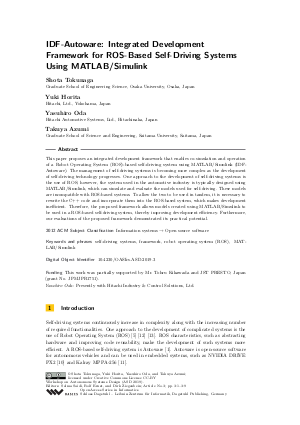IDF-Autoware: Integrated Development Framework for ROS-Based Self-Driving Systems Using MATLAB/Simulink
Authors Shota Tokunaga, Yuki Horita, Yasuhiro Oda, Takuya Azumi
-
Part of:
Volume:
Workshop on Autonomous Systems Design (ASD 2019)
Part of: Series: Open Access Series in Informatics (OASIcs)
Part of: Conference: Workshop on Autonomous Systems Design (ASD) - License:
 Creative Commons Attribution 3.0 Unported license
Creative Commons Attribution 3.0 Unported license
- Publication Date: 2019-03-28
File

PDF
OASIcs.ASD.2019.3.pdf
- Filesize: 1.75 MB
- 9 pages
Document Identifiers
Subject Classification
ACM Subject Classification
- Information systems → Open source software
Keywords
- self-driving systems
- framework
- robot operating system (ROS)
- MATLAB/Simulink
Metrics
- Access Statistics
-
Total Accesses (updated on a weekly basis)
0PDF Downloads0Metadata Views
Abstract
This paper proposes an integrated development framework that enables co-simulation and operation of a Robot Operating System (ROS)-based self-driving system using MATLAB/Simulink (IDF-Autoware). The management of self-driving systems is becoming more complex as the development of self-driving technology progresses. One approach to the development of self-driving systems is the use of ROS; however, the system used in the automotive industry is typically designed using MATLAB/Simulink, which can simulate and evaluate the models used for self-driving. These models are incompatible with ROS-based systems. To allow the two to be used in tandem, it is necessary to rewrite the C++ code and incorporate them into the ROS-based system, which makes development inefficient. Therefore, the proposed framework allows models created using MATLAB/Simulink to be used in a ROS-based self-driving system, thereby improving development efficiency. Furthermore, our evaluations of the proposed framework demonstrated its practical potential.
Cite As Get BibTex
Shota Tokunaga, Yuki Horita, Yasuhiro Oda, and Takuya Azumi. IDF-Autoware: Integrated Development Framework for ROS-Based Self-Driving Systems Using MATLAB/Simulink. In Workshop on Autonomous Systems Design (ASD 2019). Open Access Series in Informatics (OASIcs), Volume 68, pp. 3:1-3:9, Schloss Dagstuhl – Leibniz-Zentrum für Informatik (2019)
https://doi.org/10.4230/OASIcs.ASD.2019.3
BibTex
@InProceedings{tokunaga_et_al:OASIcs.ASD.2019.3,
author = {Tokunaga, Shota and Horita, Yuki and Oda, Yasuhiro and Azumi, Takuya},
title = {{IDF-Autoware: Integrated Development Framework for ROS-Based Self-Driving Systems Using MATLAB/Simulink}},
booktitle = {Workshop on Autonomous Systems Design (ASD 2019)},
pages = {3:1--3:9},
series = {Open Access Series in Informatics (OASIcs)},
ISBN = {978-3-95977-102-3},
ISSN = {2190-6807},
year = {2019},
volume = {68},
editor = {Saidi, Selma and Ernst, Rolf and Ziegenbein, Dirk},
publisher = {Schloss Dagstuhl -- Leibniz-Zentrum f{\"u}r Informatik},
address = {Dagstuhl, Germany},
URL = {https://drops.dagstuhl.de/entities/document/10.4230/OASIcs.ASD.2019.3},
URN = {urn:nbn:de:0030-drops-103367},
doi = {10.4230/OASIcs.ASD.2019.3},
annote = {Keywords: self-driving systems, framework, robot operating system (ROS), MATLAB/Simulink}
}
Author Details
Funding
This work was partially supported by Mr. Tohru Kikawada and JST PRESTO, Japan (grant No. JPMJPR1751).
- Oda, Yasuhiro: Presently with Hitachi Industry & Control Solutions, Ltd.
References
- Autoware/github.com. URL: http://github.com/CPFL/Autoware.
- IDF-Autoware/github.com. URL: https://github.com/T-Shota/IDF-Autoware.
- MATLAB/Simulink. URL: http://www.mathworks.com.
- Robotics System Toolbox. URL: https://mathworks.com/products/robotics.html.
- ROS.org. URL: http://www.ros.org.
- ROS.org/rosnode. URL: http://wiki.ros.org/rosnode.
- ROS.org/rqt_graph. URL: http://wiki.ros.org/rqt_graph.
- wxglade.sourceforge.net. URL: http://wxglade.sourceforge.net.
- wxpython.org. URL: http://wxpython.org.
-
S. Kato, S. Tokunaga, Y. Maruyama, S. Maeda, M. Hirabayashi, Y. Kitsukawa, A. Monrroy, T. Ando, Y. Fujii, and T. Azumi. Autoware on Board: Enabling Autonomous Vehicles with Embedded Systems. In Proc. of ICCPS, 2018.

-
Y. Maruyama, S. Kato, and T. Azumi. Exploring Scalable Data Allocation and Parallel Computing on NoC-Based Embedded Many Cores. In Proc. of ICCD, 2017.

-
M. Quigley, K. Conley, B. Gerkey, J. Faust, T. Foote, J. Leibs, E. Berger, R Wheeler, and A. Ng. ROS: an open-source Robot Operating System. In Proc. of ICRA, Open-Source Software Workshop, 2009.

-
Y. Saito, T. Azumi, S. Kato, and N. Nishio. Priority and Synchronization Support for ROS. In Proc. of CPSNA, 2016.

